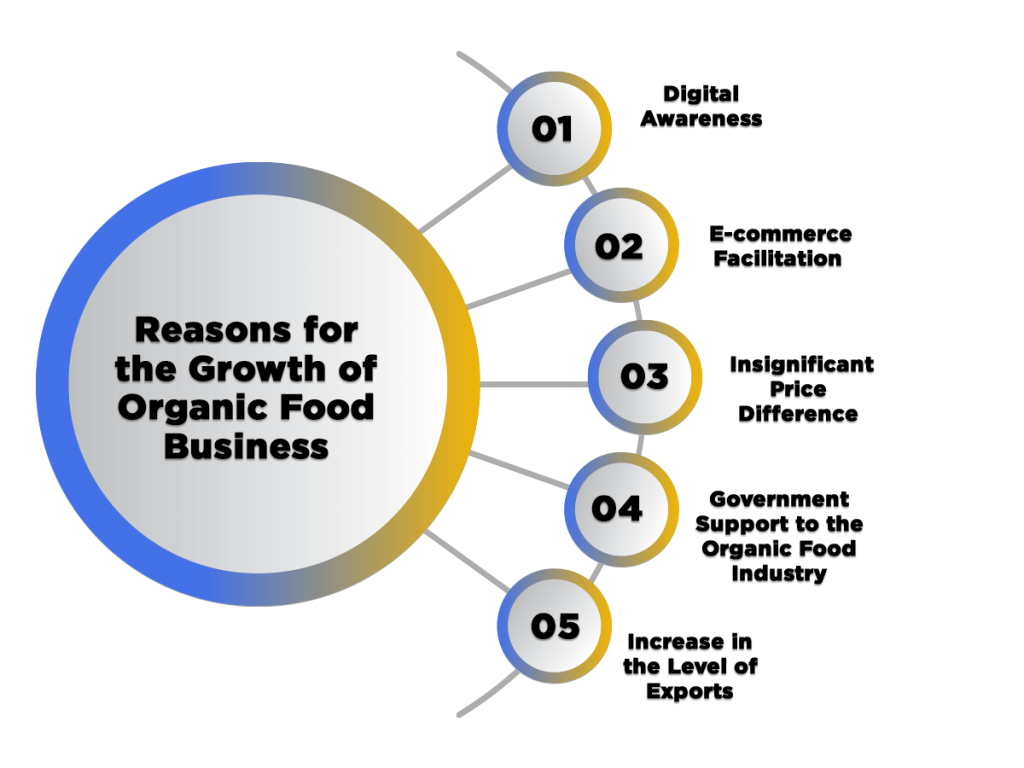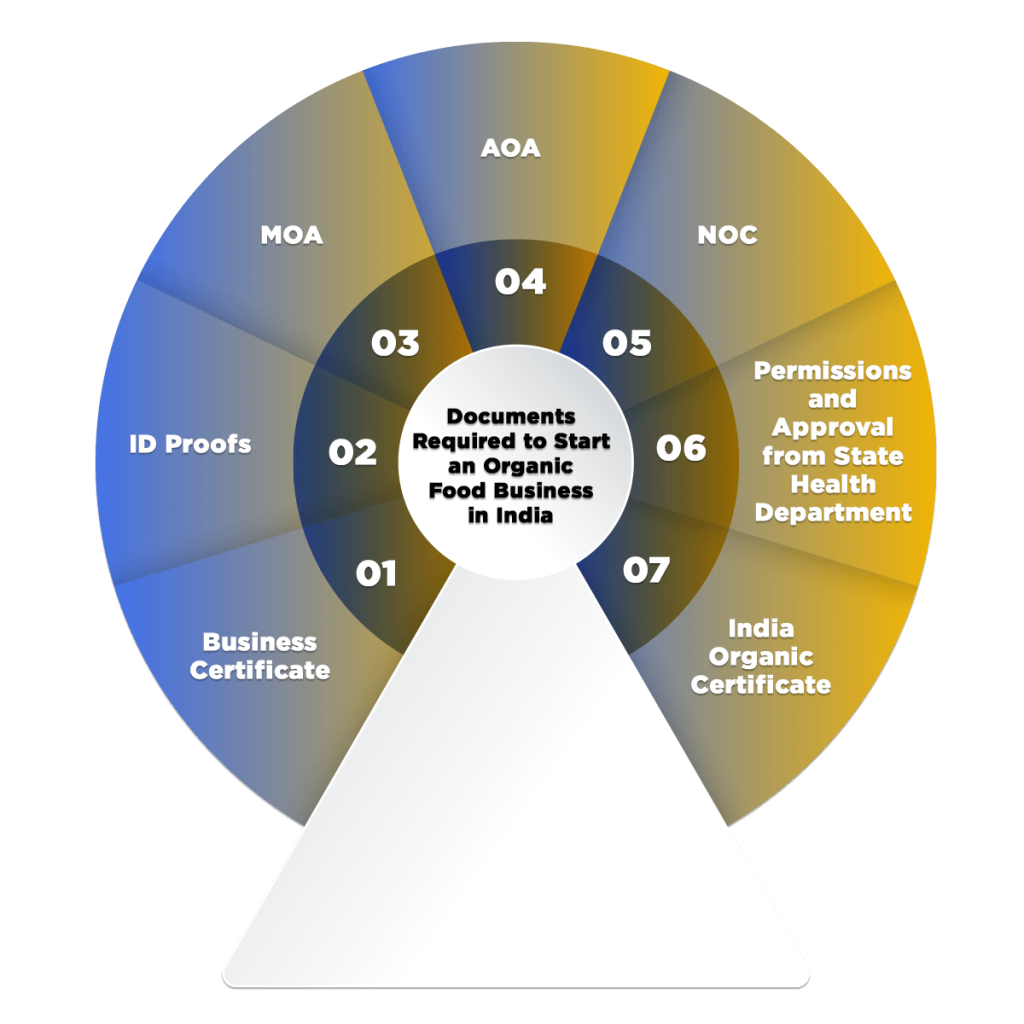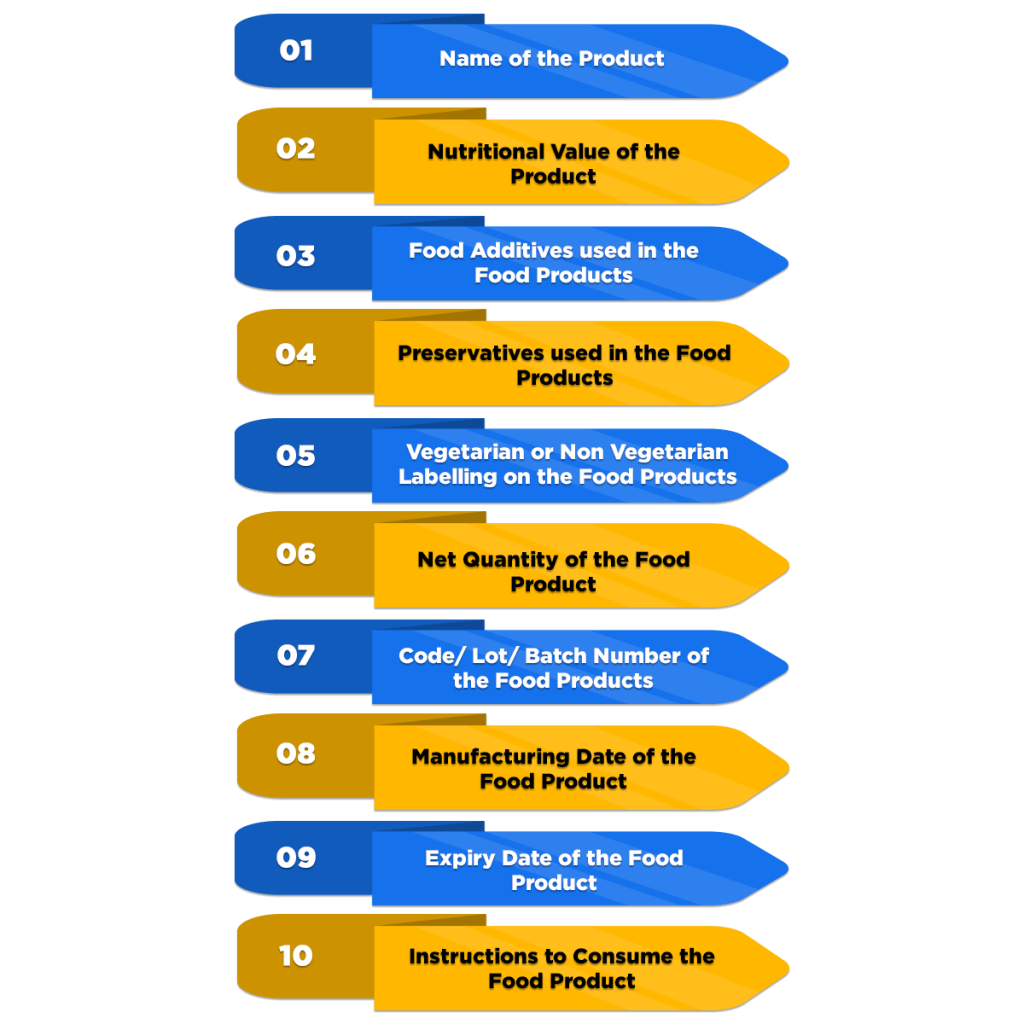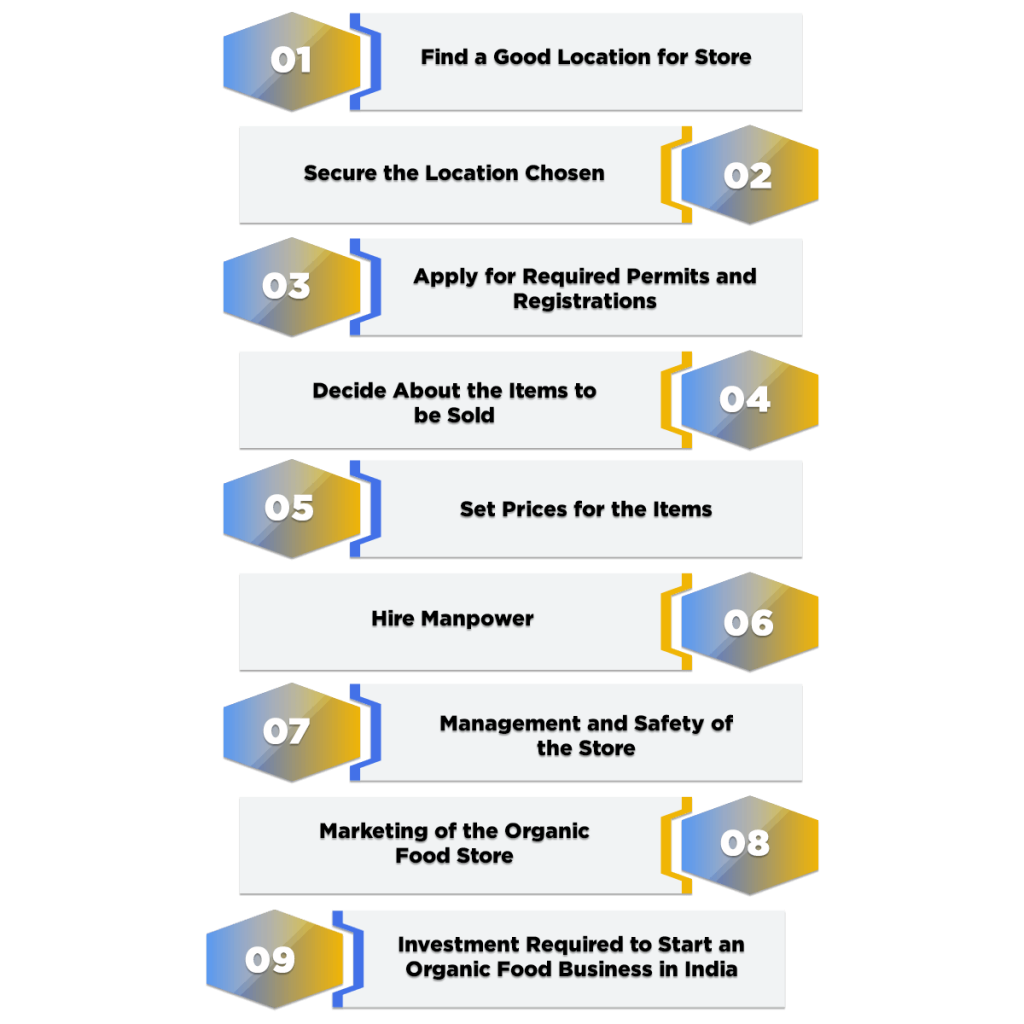Start an Organic Food Business in India: A Complete Guide

Shivani Jain | Updated: Sep 23, 2020 | Category: News
The term “Start an Organic Food Business in India” denotes a business idea that revolves around purchasing, selling, and labeling of the Organic Food. Further, the term “Organic Food” is defined under section 22 of the FSS Act 2006.
In this blog, we will discuss the concept of “Start an Organic Food Business in India” and the checklist of licenses required for the same.
Table of Contents
Concept of Organic Food
According to section 22 of the Food Safety and Standardization Act 2006, the term “Organic Food” means the food products produced as per the standards prescribed for the production of organic food in India.
Further, the term “Organic Food Business” denotes a business that is involved in manufacturing, selling, purchasing, and labeling of the Organic Food items in India.
However, it shall be relevant to note that the Organic Food items, Irradiated Food, Genetically Modified Articles, and Novel Food will not be used in the following:
- Special Dietary Uses;
- Functional Food;
- Nutraceuticals;
- Health Supplements;
- Proprietary Food;
- And any other item as specified by the Central Government;
Regulatory Authorities for the Organic Food Business
The Regulatory Authorities involved in the Process of Granting License to Start an Organic Food Business in India are as follows:
Food Safety and Standards Authority of India
The Food Safety and Standard Authority of India or FSSAI is responsible for keeping a check on the Organic Businesses operating in India. It also ensures that every organic business must obtain certification from the systems as follows:
- Participatory Guarantee System (PGS); and
- National Program for Organic Production (NPOP);
Participatory Guarantee Scheme
The Participatory Guarantee Scheme or PGS is a system provided by the MoAFW (Ministry of Agriculture and Farmers Welfare). It is an internationally recognised OQA (Organic Quality Assurance), such as the ISO 9000.
PGS is implemented and controlled by the organic farmers or producers. Under this, the farmers actively participate with the customers in a process, which is based on absolute trust.
Therefore, PGS or Participatory Guarantee Scheme is a “Certification Scheme” for Organic Foods.
National Program for Organic Production
The National Program for Organic Production or NPOP is a certification scheme provided by the MoCI (Ministry of Commerce and Industry). This scheme was initiated to assist the farmers in flourishing both Indian and International Markets.
Reasons for the Growth of Organic Food Business

The Reasons for the Growth of Organic Food Business in India are as follows:
- Digital Awareness;
- E-commerce Facilitation;
- Insignificant Price Difference;
- Government Support to the Organic Food Industry; and
- Increase in the Level of Exports;
Statistics Regarding Growth of Organic Food Business
The Recent Statistics that shows the Growth of Organic Food Business are as follows:
- As per a Joint Report published by the Ernst & Young and Assocham, in India, the organic food products market has been increasing at a CAGR (Compound Annual Growth Rate) of 25% and the is expected to reach Rs 10000 to Rs 12000 crores by the end of the year 2020 from the prevailing market size of Rs 4000 crores.
- As per a Report published by the TechSci Research Private Limited, the Global Organic Food Market stood at $110.25 billion in the year 2016. Further, the same is expected to grow at a CAGR of 16.15%, in the terms of value, during 2017–2022, to reach $ 262.85 billion by the end of the year 2022. Furthermore, the Indian Organic Food Market is anticipated to reach at a CAGR of over 23% by the end of 2023, on account of the favorable government policies supporting the organic farming together with the rising land area under organic cultivation.
- As per a Report published by the IMARC, in the year 2019, the Indian Organic Food Market had reached a value of $ 731 million.
- As per a Report published by IBEF (India Brand Equity Foundation), the Indian Organic Food Market is expected to cross $ 1.36 billion by the end of 2020.
Top Organic Food Start-ups in India
The top Organic Food Start-ups in India are as follows:
- Just Organik;
- Naturally Yours;
- Joy by Nature;
- Brewhouse;
- Earth Food;
- I Say Organic;
- Living Greens Organic;
- Organic Life;
- Farm2kitchen;
- Nutri Bucket;
- Organic Shop;
- EkGaon;
Documents Required to Start an Organic Food Business in India

The documents required to start an Organic Food Business in India are as follows:
- Business Certificate;
- ID Proofs, such as PAN Card, Voter ID, Aadhar Card, or Driving License;
- MOA (Memorandum of Association);
- AOA (Articles of Association);
- NOC (No Objection Certificate);
- Permissions and Approval from State Health Department; and
- India Organic Certificate;
Government Initiatives to Boost Organic Food Business in India
The initiatives taken by the government to boost Organic Food Business in India are as follows:
- The GOI (Government of India) has formulated PGS (Participatory Guarantee System) to provide subsidies to small farmers who are backed by the PKVY scheme (Pradhan Mantri Kaushal Vikash Yojna);
- In the year 2017, the GOI launched the “Jaivik Bharat Logo” and “India Organic Integrity Database Portal” to assist both organic farmers and associated food businesses;
- Certification Norms has now been relaxed by FSSAI for the Individuals and Organisations that are having an Annual Income below Rs 12 Lakhs. Further, the same has been done to promote and boost Organic Farming;
- The Government has started Standardizing Government Policies with respect to fertilizers and making organic fertilizers more accessible and handier by increasing its production and manufacture. The Organic Fertilizers will assist the organic Farmers in improving their yield;
- The GOI has declared that the organisations that are having an Annual Turnover below Rs 50 Lakhs can sell their Organic Foods Items without acquiring Certification from PGS (Participatory Guarantee System) or NPOP (National Program for Organic Production). However, it shall be relevant to note that such organizations are not permitted to use the “Jaivik Bharat Logo”.
- Other schemes that supported Organic Farming in India are as follows:
- RKVY (Rashtriya Krishi Vikas Yojana);
- MIDH (Mission for Integrated Development of Horticulture); and
- Network Project on Organic Farming;
Labelling Requirements for Organic Food Business

An Organic Food Business in India is required mandatorily to display the “India Organic Certificate” on the outer packaging of the items and products. Further, the Food Safety and Standards (Packaging and Labelling) Regulations 2011 has laid down the contents which need to be there on the labels of all the organic food products manufactured in India:
The labelling requirements to start an Organic Food Business in India are as follows:
- Name of the Product;
- Nutritional Value of the Product;
- Food Additives used in the Food Products;
- Preservatives used in the Food Products;
- Vegetarian or Non Vegetarian Labelling on the Food Products;
- Net Quantity of the Food Product;
- Code/ Lot/ Batch Number of the Food Products;
- Manufacturing Date of the Food Product;
- Expiry Date of the Food Product; and
- Instructions to Consume the Food Product;
Checklist to Start an Organic Food Business in India

The Factors included in the Checklist to start an Organic Food Business in India are as follows:
Find a Good Location for Store
The first and the lengthiest step in the checklist to Start an Organic Food Business in India is to find a premium location for setting up a Organic Food Store. Further, the entrepreneur must choose a location that is high on foot-fall and people are interested in buying Organic Food Stuff, but low on competitors.
Secure the Location Chosen
In the next step, the proposed owner needs to enter into a lease agreement with the landlord for the premises, which is taken on rent to start the store. Further, the proposed owner must take special attention towards the maintenance and designing of the location.
Apply for Required Permits and Registrations
The legal requirements or formalities that are required to be fulfilled for starting an Organic Food Business in India are as follows:
- The owner of the organic food business needs to obtain a Trade Permit or Trade License from the Health Department;
- Obtain Certification for Organic Food Store from the Organic Trade Association;
- Acquire FSSAI License from the Food Safety and Standardization Authority of India;
- The owner must apply for Employer Identification Number or EIN;
- The owner also needs to select the type entity or business format that he/she wants to start. Further, the term “Business Format” includes Sole Proprietorship or Partnership Firm;
- He/she also needs to apply for GST Registration, if the annual turnover of the business is above Rs 20 Lakhs for the previous Financial Year;
- The owner requires to apply for PAN Number as well;
- Lastly, he/she needs to open a Current Bank Account for the Business;
Decide About the Items to be Sold
This is yet again a significant step. Under this, the owner needs to decide about the Food Items that he/she wants to sell in the store. Further, it shall be relevant to note that the owner must include detail market analysis and research study before deciding the products, as the profitability of a whole business depends on this factor.
Set Prices for the Items
Deciding the Prices involves a lot of calculation. That means if the prices are too low, then the profitability of the business will be affected, despite the volume of sales will be high, and the business will not be able to cover its Fixed and Variable Costs.
However, on the other side, if the prices decided are too high then it may result in fewer customers. Therefore, it is necessary to properly calculate the prices of each type of product.
Hire Manpower
Every business must not only have the optimal quality of the food products, but experienced and trained staff as well. An experienced person will easily and effectively manage finance, sales, operations, marketing, purchases and stores, than a normal person.
Further, the number and size of staff will depend on the basis of the operations of the business.
Management and Safety of the Store
For the safety and management of the store, it is advisable to install CCTV cameras in premises to avoid the chances of theft.
Marketing of the Organic Food Store
The term “Marketing” includes various types of marketing techniques, such as the following:
- Word of Mouth;
- Advertising on Social Media;
- Create a Website;
- Prints Hoarding and Banners; and
- Make Posters;
Investment Required to Start an Organic Food Business in India
On an average around Rs 10 lakhs to Rs 11 lakhs are needed as Investment to start an Organic Food Business in India. Further, the amount of investment includes the factors as follows:
- Deposit for Rented Premises;
- Cost for Paying Salaries;
- Operating Cost;
- Inventory for Organic Food Products; and
- Furnishing and Interior Decoration;
Conclusion
Nowadays, the idea to start an Organic Food Business in India is a popular and accessible affair. However, this business format does require a lot of registrations and permits, such as FSSAI License, India Organic Certificate, Employer Identification Number, etc.
Further, these licenses and registration are required for easy and smooth business operations but are intricate to obtain.
Reach out to Swarit Advisors, our experts rank high in delivery on-time registration, that, too in a hassle-free and straightforward manner.
More on Food Business: How to Start a Restaurant Business in India














